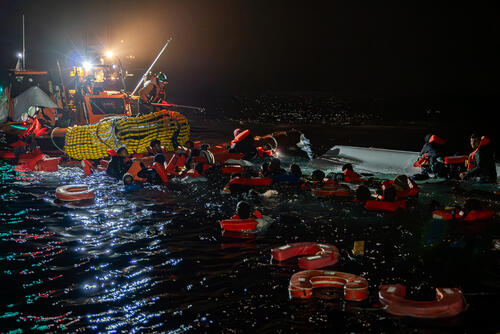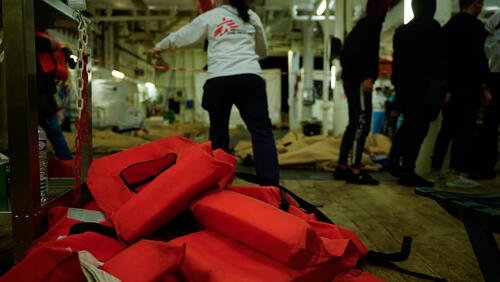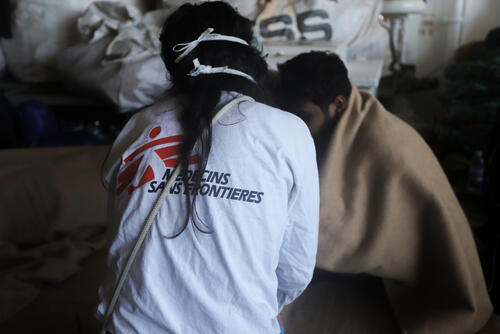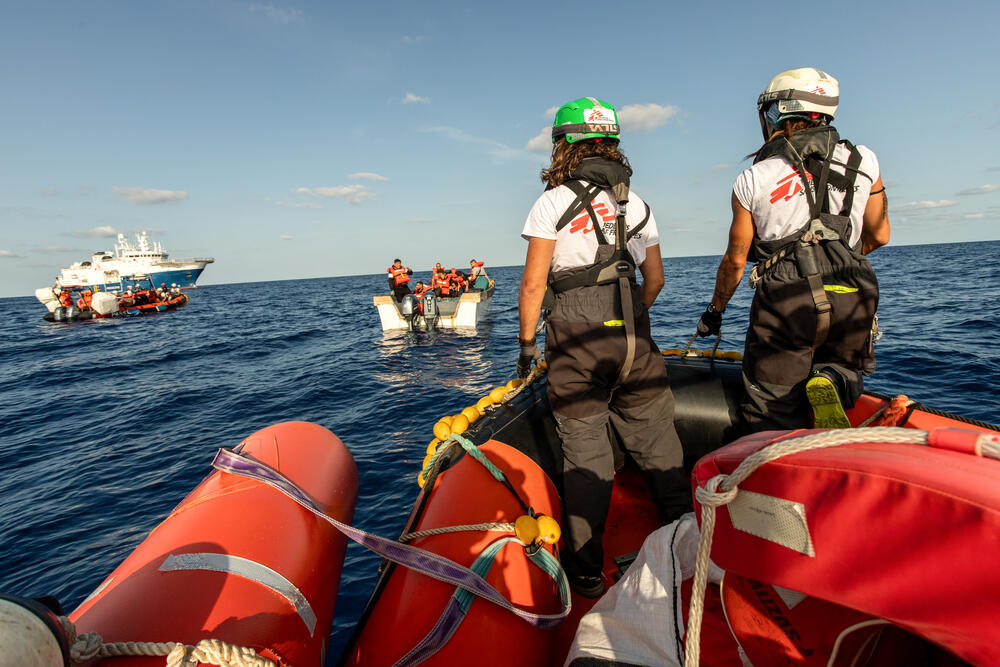Mediterranean search and rescue
Every year, thousands of people fleeing violence, insecurity, and persecution attempt to cross the Mediterranean Sea.
They make this treacherous journey via North Africa and Turkey, in search of relative safety in Europe.
And, every year, countless lives are lost at sea, while people face unimaginable cruelty on their way through transit countries such as Libya.
Between 2014 and 2022, at least 20,248 people have drowned or gone missing while attempting to cross the Central Mediterranean. It is widely considered to be the world's deadliest border.
Even when there are no rescue boats at sea, people still risk their lives by trying to cross the Mediterranean in flimsy rubber and wooden dinghies.
This is because, for many, this journey is the last resort. A lack of search and rescue capacity only serves to make the risks they face more extreme.
Help us care for people seeking safety
Our independent funding from private donors like you allows us to work in the Mediterranean. It means we can provide medical care where the need is greatest, with no strings attached.
On 13 May 2021, Médecins Sans Frontières/Doctors Without Borders (MSF) chartered its own ship, the Geo Barents, to save lives in the Central Mediterranean and provide emergency medical care to survivors.
In 2022 alone, MSF teams rescued 3850 people in the Mediterranean (an increase of 100% compared to 2021). The Geo Barents remains operational in 2023: the tenth consecutive year that MSF has been compelled to launch search and rescue operations. We do this because EU states are abdicating their humanitarian responsibility to provide proactive search and rescue, leaving a deadly gap.
Search and rescue: In numbers
4,650
PEOPLE RESCUED AT SEA BY MSF IN 2023
4,580
OUTPATIENT CONSULTATIONS BY MSF IN 2023
260
INDIVIDUAL MENTAL HEALTH CONSULTATIONS BY MSF IN 2023
Violence in Libya
The majority of people attempting the dangerous Central Mediterranean route leave via Libya, where refugees and migrants face arbitrary detention, extortion, torture and – all too often – death.
However, not only are European governments abandoning people at sea, they are actively supporting forced returns to Libya. In 2022 alone, more than 55,700 people were intercepted at sea and taken back.
MSF has documented countless harrowing testimonies of violence against men, women and children trapped between Libya and the sea.
On board the Geo Barents, 84 percent of violent events reported to our teams had occurred in Libya. This includes significant levels of violence against women and children – 29 percent were minors, the youngest being just eight years old.
MSF search and rescue: The facts
Everyone has the right to flee for their safety, to seek asylum, and to have their asylum claim assessed. At no point should this involve anyone being forced to risk their lives.
Refugees, migrants and asylum seekers are not interchangeable terms. The following is a brief explanation of the very different legal definitions:
- A refugee is a person who has fled his or her country and cannot return because of a well-founded fear of persecution due to their race, religion, nationality, or membership of a particular social group. Refugee status is assessed by the United Nations High Commission for Refugees or a sympathetic state.
- An asylum-seeker is someone who says he or she is a refugee and is seeking asylum in another country, but whose claim has not yet been definitively evaluated.
- A migrant is someone who chooses to move in order to improve the future prospects of themselves and their families.
As a humanitarian organisation, MSF does not have a mandate or means to assess the immigration status of the people we assist.
We provide medical care without judgment and strongly believe that no human being should drown when the means exist to prevent it.
Our primary aim is to prevent loss of life, not to provide transport.
International law says that people rescued should be disembarked in a place of safety.
As a humanitarian organisation concerned with the well-being of vulnerable people rescued, we will seek to swiftly disembark in the closest safe port.
MSF does not decide the port of disembarkation - this is decided by the competent maritime authorities.
The Geo Barents is a research vessel, built in 2007. The ship has undergone modifications to operate as a rescue vessel and is now fully equipped with a medical clinic and recovery rooms.
The ship can carry 300 survivors on board but could, if needed in an emergency, accommodate more.
Geo Barents will be prepared for the likelihood of having people on board for longer periods given the previous experience with long stand-offs at sea.
With the arrival of the COVID-19 pandemic, we prepared ourselves for the possibility of an outbreak on board and began taking all necessary precautions to mitigate the risks associated with this.
We are compelled first and foremost to assist people who are dying in the Mediterranean. We have the means and, for us, ignoring the problem is not an option.
Of course, we are aware that by doing this we are entering a very contentious political debate in Europe.
But we believe that inaction cannot be justified on ideological grounds and that, in fact, as a medical organisation that takes its cues from medical ethics, we must take action.
You can read more about our principles here.
Search and rescue: News and stories

Search and Rescue: 470 people rescued by Geo Barents within 72 hours - now they need a place of safety

“Survivors showed me their scars and told me how they were beaten by guards in Libya”

